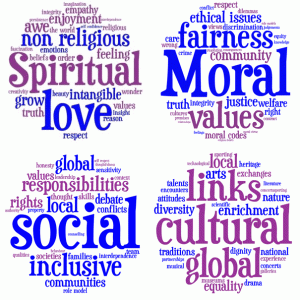SMSC
SMSC is taught at Hillside Primary School as a ‘hidden subject’. As teachers, we have a duty to shape the values, attitudes and character of the next generation. It is crucial for both individual pupils and society as a whole- this subject area contributes significantly to creating a ‘well rounded pupil’ by the end of Key Stage Two. Our teaching of SMSC is woven like golden thread throughout the curriculum. It is evidenced throughout the school in children’s books, on displays and within every year group’s whole class SMSC book, demonstrating learning that has taken place within that particular year group.
SMSC is the over- arching umbrella that encompasses personal development across the whole curriculum. It requires us, as teaching staff within the school. to think about the type of people we aspire to be, the type of world we aspire to create and the type of education that we aspire to provide. SMSC is broken down into four strands:
Spiritual Development is the development of the non-material element of a human being which animates and sustains us and, depending on our point of view, either ends or continues in some form when we die. It is about the development of a sense of identity, self-worth, personal insight, meaning and purpose. It is about the development of a pupil’s ‘spirit’. Some people may call it the development of a pupil’s soul; others as the development of ‘personality’ or ‘character’. (OFSTED 2004)
Moral Development - The essence of moral development is to build a framework of values which regulates their personal behaviour. It is also about the development of pupils’ understanding of society’s shared and agreed values. It is about the understanding that there are issues where there is disagreement and it is also about understanding that society’s value change. Moral development is about gaining an understanding of the range of views and the reasons for the range. It is also about developing an opinion about the different views. (OFSTED 2004)
Social Development - ‘Pupils who are socially aware adjust appropriately and sensitively to a range of social contexts. They relate well to others and work successfully as a member of a team. Older pupils share their views and opinions and work towards trying to reach a sensible solution. They show respect for people, living things, property and the environment.’ OFSTED 2003
Cultural Development is about pupils’ understanding their own culture and other cultures in their town, region and country as a whole. It is about understanding cultures represented in Europe and elsewhere in the world. It is about understanding and feeling comfortable in a variety of cultures and being able to operate in the emerging world of culture of shared experiences provided by television, travel and the internet. It is about understanding that cultures are always changing and coping with change. Promoting pupils’ cultural development is intimately linked with schools’ attempts to value cultural diversity and prevent racism. (OFSTED 2004)
British Values Curriculum Map - SMSC
